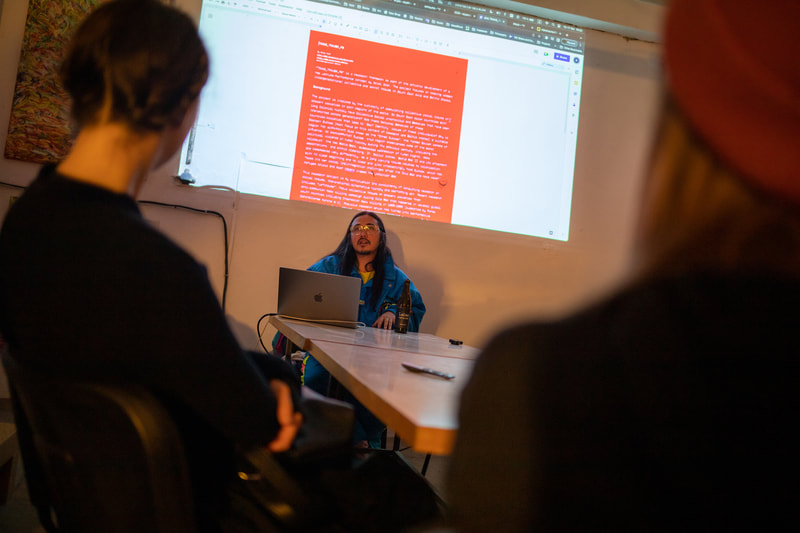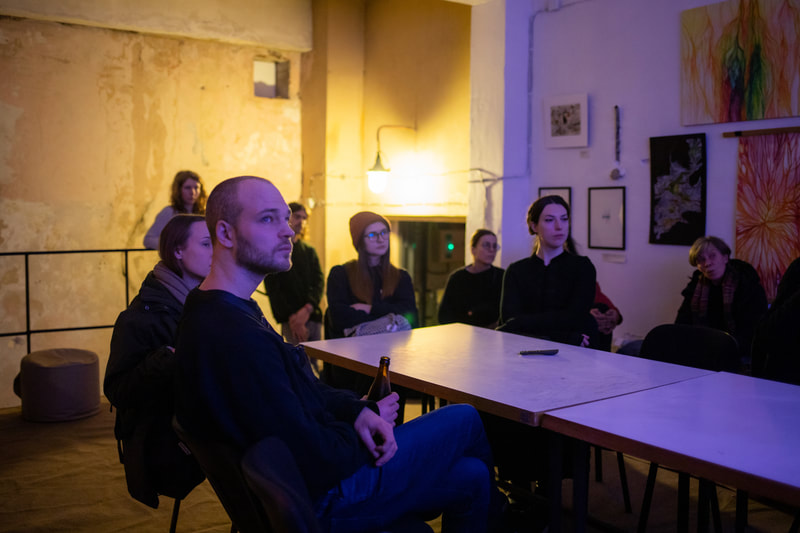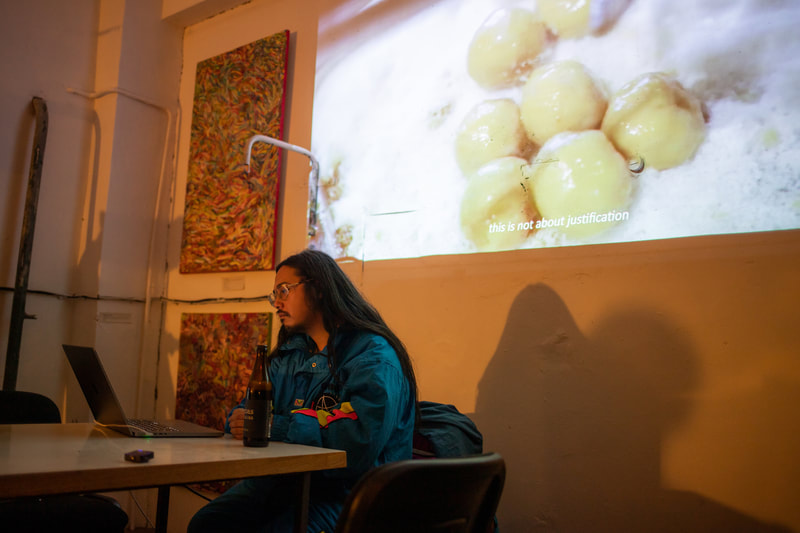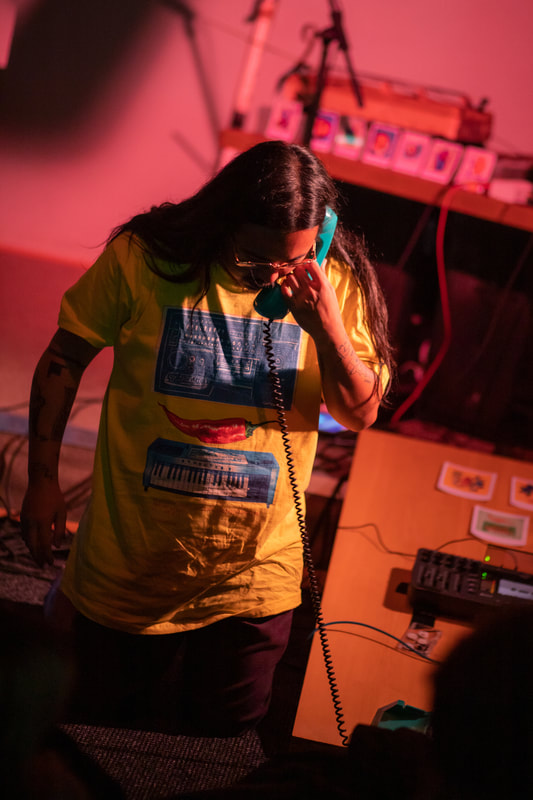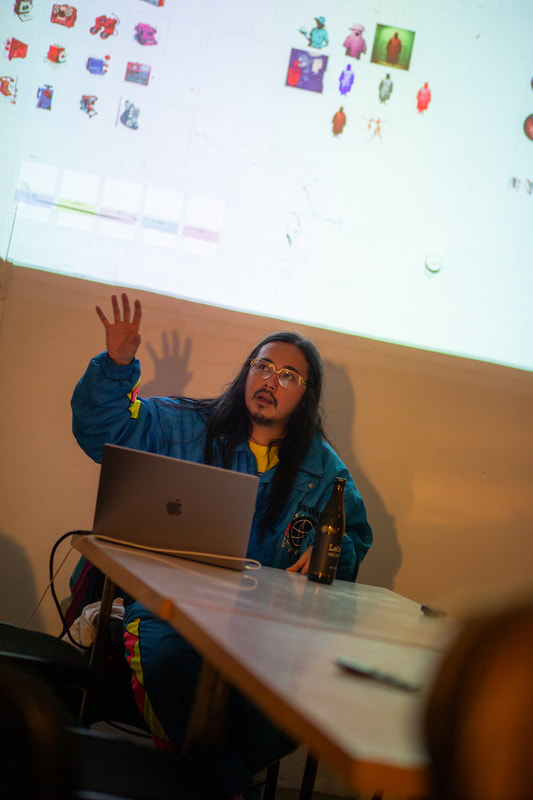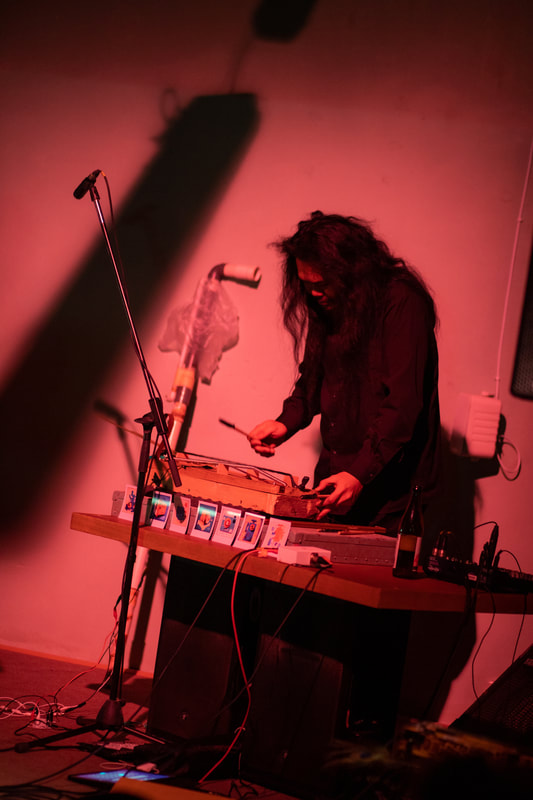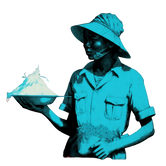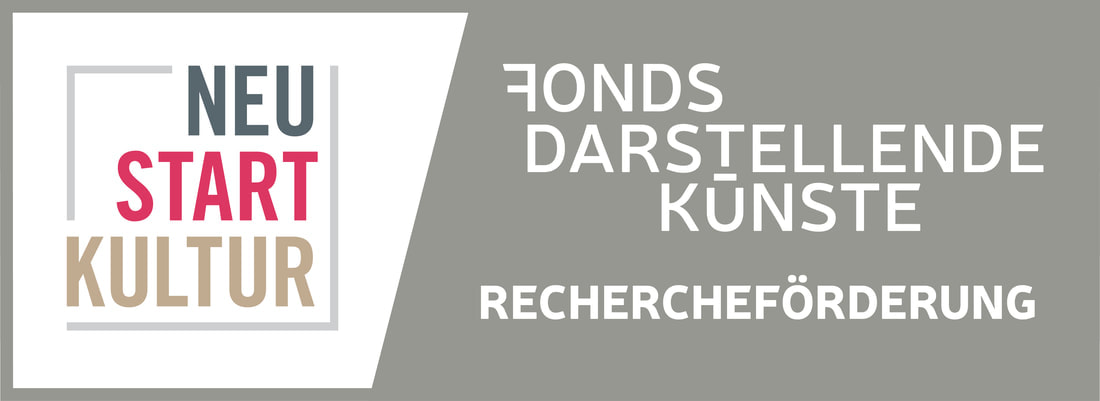TRANS
TRAUMA
FM_
“TRANS_TRAUMA_FM” is a research framework as part of the artistic development of a new Lecture-Performance concept by Ariel Orah. The project focuses on tracing common intergenerational collective and social trauma in South East Asia and Baltic States.
The project aims to answer the main research question:
“How to turn common intergenerational collective and social trauma into an object of discourse within a performance?
Background
The project is inspired by the curiosity of speculating collective social trauma on present societies in both regions of the world. Do South East Asian countries with long Colonial history have Collective Social Unconscious and Memories that have been transmitted across generations? Are there National Memories of these countries/societies that lead to ‘Self Identity’ issues of these individuals? Why is Eastern Europe (most focus on this context of research are Baltic states) a suitable region for discussion? Also known as the “Other Europe”, the former Soviet sphere of influence, or postcommunist Europe, this region experienced some of the worst political violence in human history during the previous century, including the Holocaust, the two World Wars, widespread repression of human rights, mass deportations, and ethnic cleansing. In Baltic states, World War II and its aftermath are remembered very differently, as a long lasting trauma related to colonization with no clear beginning and no clear end. Also interestingly from Europe, which has faced its own social (re)integration challenges after the Cold War and more recent refugee crisis and most recent indeed the Ukrainian War.
This research project is my continuation and consistency of conducting research on social trauma, transnational/alternative history and performing art. Recent research includes “Leftrauma”, focus collective trauma on present societies from anti-communist mass killing campaign during Cold War that happened in several global south counties including Indonesian mass killing in 1965-1966 (supported by Fonds Darstellende Künste e.V). Previous research which has turned into performative artistic output includes “GAUNG – UNVORHERBESTIMMTE RESONANZ “ - Lecture Performance about Encounter of National Identity Stereotype (premiered in Ballhaus Naunynstrasse) and “Aryati”, an experimental theater piece about the transformation of Keroncong music against the backdrop of Indonesian history. The work depicts the decolonization process of keroncong music from 1920 to 1990, from a colonial product to a claimed indigenous cultural heritage, supported by Haupstadtkulturfonds.
Project structure
Part 1 : Contextualisation Phase
The objective of this part is to define : area of research, field of problematicity (a ground where problems, doubts, questions, ideas, hypotheses, analytical and creative solutions, become later analytic-able).. Within this space, sub questions are structured and formulated. The methods on this part will be pursued by collecting quantitative data and materials through literature references, interviews, and focus group discussion. Literature examples include “Decolonization of Trauma and Memory Politics: Insights from Eastern Europe” by Dovile Budryte and “Social Unconscious and Transgenerational Trauma from Colonial Past in Asian Leaders” by Binayak Bagchi.
Part 2 : Analytical Phase
The objective of this part is to analyze various epistemic objects from part one and investigate the relation and potential narrative with the main research question on “How to turn “collective post socialist trauma” into an object of discourse within a performance?”
Part 3 : Formation Phase
The objective of this part is to have a performance framework plan which is later will take into production phase. The method will be sense-making those analytical results and situated in a landscape and planning what to do with such objects. This is the phase that enables the formation of discourse objects of collective trauma with performing art elements and epistemics components.
Part 1 : Contextualisation Phase
The objective of this part is to define : area of research, field of problematicity (a ground where problems, doubts, questions, ideas, hypotheses, analytical and creative solutions, become later analytic-able).. Within this space, sub questions are structured and formulated. The methods on this part will be pursued by collecting quantitative data and materials through literature references, interviews, and focus group discussion. Literature examples include “Decolonization of Trauma and Memory Politics: Insights from Eastern Europe” by Dovile Budryte and “Social Unconscious and Transgenerational Trauma from Colonial Past in Asian Leaders” by Binayak Bagchi.
Part 2 : Analytical Phase
The objective of this part is to analyze various epistemic objects from part one and investigate the relation and potential narrative with the main research question on “How to turn “collective post socialist trauma” into an object of discourse within a performance?”
Part 3 : Formation Phase
The objective of this part is to have a performance framework plan which is later will take into production phase. The method will be sense-making those analytical results and situated in a landscape and planning what to do with such objects. This is the phase that enables the formation of discourse objects of collective trauma with performing art elements and epistemics components.
Part 1
Contextualisation Phase divided into Literature review, field research, and participatory research performance.
LITERATURE REVIEW
"Decolonization of Trauma and Memory Politics: Insights from Eastern Europe" by Dovile Budryte
"Social Unconscious and Transgenerational Trauma from Colonial Past in Asian Leaders" by Binayak Bagchi
several potential connections between the two books.
First, both books highlight the long-lasting impact of historical trauma on individuals and societies. "Decolonization of Trauma and Memory Politics" focuses on the trauma experienced in Eastern Europe due to war, genocide, and political repression, while "Social Unconscious and Transgenerational Trauma from Colonial Past in Asian Leaders" explores the trauma resulting from colonialism and imperialism in Asia. Both books argue that this trauma can be passed down through generations and shape cultural norms, beliefs, and values.
Second, both books highlight the importance of understanding the cultural context of trauma and healing. "Social Unconscious and Transgenerational Trauma from Colonial Past in Asian Leaders" emphasizes the role of traditional Asian practices such as meditation, yoga, and acupuncture in addressing transgenerational trauma. Similarly, "Decolonization of Trauma and Memory Politics" highlights the role of art and culture in the decolonization of trauma and memory politics in Eastern Europe.
Finally, both books emphasize the need for collective healing and reconciliation in societies affected by historical trauma. "Social Unconscious and Transgenerational Trauma from Colonial Past in Asian Leaders" argues that acknowledging the trauma of the past and working to heal it can help to build more just and equitable societies in the future. Similarly, "Decolonization of Trauma and Memory Politics" suggests that confronting and working through traumatic experiences is important for both individuals and society as a whole, and that memory is not a neutral or objective process but is shaped by power dynamics and political interests.
INTERVIEW
I did 6 interviews with diaspora artists from Baltic and South East Asia backgrounds. Four of them are actually couples. One couple consists of a sound artist from Indonesia and a dancer from Lithuania. One couple consists of a photographer/performer from Thailand and a visual artist from Latvia. The other two are a antropologist researcher, documentary film maker and curator from Estonia and a performative designer from Lithuania.
FIELD RESEARCH
A field research trip to Vilnius, Riga, and Tallinn was made during the period of this research project. The focus of this research trip is to visit three museums in these three Baltic states' capitals, and examine current exhibitions that potentially can give interesting and important insights to this research project. Those exhibitions are 1. “Susitikimas, kurio nebuvo/ The Meeting that never was”, MO Museum Vilnius-Lithuania. 2.”Archaeologists of Memory”, Kumu Art Museum Tallinn-Estonia . 3.”Our Values”, Latvian National Museum of Arts Riga-Latvia.
PARTICIPATORY RESEARCH PERFORMANCE
As part of the research trip, one public event focused on presenting work on progress and experimenting with participatory research performance (in collaboration with Volnius local performers) held in Kompresorine, Vilnius in December 2022.
LITERATURE REVIEW
"Decolonization of Trauma and Memory Politics: Insights from Eastern Europe" by Dovile Budryte
- The book argues that the decolonization of trauma and memory politics in Eastern Europe is an important process for both individuals and society as a whole. It emphasizes the need to confront and work through traumatic experiences in order to heal and move forward.
- The author discusses how traumatic events such as war, genocide, and political repression can have long-lasting effects on individuals and communities. Trauma can be passed down through generations, and it can shape how people understand and interact with the world.
- The book also examines the politics of memory, or how societies remember and commemorate historical events. The author argues that memory is not a neutral or objective process, but rather is shaped by power dynamics and political interests.
- In Eastern Europe, the author notes, there is a tension between different memory narratives. For example, some groups may remember Soviet-era oppression and atrocities, while others may focus on resistance to Nazi occupation.
- The author also highlights the importance of recognizing the trauma and experiences of marginalized groups, such as women, LGBTQ+ individuals, and ethnic minorities. These groups may have been excluded or silenced from dominant memory narratives.
- Finally, the book emphasizes the role of art and culture in the decolonization of trauma and memory politics. Through artistic expression, individuals and communities can work through trauma and challenge dominant memory narratives.
"Social Unconscious and Transgenerational Trauma from Colonial Past in Asian Leaders" by Binayak Bagchi
- The book argues that the trauma of colonialism and imperialism has had a lasting impact on the social unconscious of Asian societies. This trauma can be passed down through generations, shaping cultural norms, beliefs, and values.
- The author suggests that Asian leaders, particularly those who were born during or shortly after the colonial era, may be particularly susceptible to the transgenerational trauma of their ancestors. This trauma can manifest in unconscious biases, stereotypes, and other psychological patterns that influence decision-making.
- The book examines case studies of several Asian leaders, including Mahatma Gandhi, Jawaharlal Nehru, and Lee Kuan Yew, to illustrate how the social unconscious can shape leadership styles and political agendas. For example, the author suggests that Gandhi's nonviolent resistance to British colonial rule may have been influenced by his family's history of resistance to the Mughal Empire.
- The author also highlights the importance of understanding the cultural context of trauma and healing. For example, he suggests that traditional Asian practices such as meditation, yoga, and acupuncture can be effective in addressing transgenerational trauma.
- Finally, the book emphasizes the need for collective healing and reconciliation in Asian societies. The author argues that acknowledging the trauma of the past and working to heal it can help to build more just and equitable societies in the future.
several potential connections between the two books.
First, both books highlight the long-lasting impact of historical trauma on individuals and societies. "Decolonization of Trauma and Memory Politics" focuses on the trauma experienced in Eastern Europe due to war, genocide, and political repression, while "Social Unconscious and Transgenerational Trauma from Colonial Past in Asian Leaders" explores the trauma resulting from colonialism and imperialism in Asia. Both books argue that this trauma can be passed down through generations and shape cultural norms, beliefs, and values.
Second, both books highlight the importance of understanding the cultural context of trauma and healing. "Social Unconscious and Transgenerational Trauma from Colonial Past in Asian Leaders" emphasizes the role of traditional Asian practices such as meditation, yoga, and acupuncture in addressing transgenerational trauma. Similarly, "Decolonization of Trauma and Memory Politics" highlights the role of art and culture in the decolonization of trauma and memory politics in Eastern Europe.
Finally, both books emphasize the need for collective healing and reconciliation in societies affected by historical trauma. "Social Unconscious and Transgenerational Trauma from Colonial Past in Asian Leaders" argues that acknowledging the trauma of the past and working to heal it can help to build more just and equitable societies in the future. Similarly, "Decolonization of Trauma and Memory Politics" suggests that confronting and working through traumatic experiences is important for both individuals and society as a whole, and that memory is not a neutral or objective process but is shaped by power dynamics and political interests.
INTERVIEW
I did 6 interviews with diaspora artists from Baltic and South East Asia backgrounds. Four of them are actually couples. One couple consists of a sound artist from Indonesia and a dancer from Lithuania. One couple consists of a photographer/performer from Thailand and a visual artist from Latvia. The other two are a antropologist researcher, documentary film maker and curator from Estonia and a performative designer from Lithuania.
FIELD RESEARCH
A field research trip to Vilnius, Riga, and Tallinn was made during the period of this research project. The focus of this research trip is to visit three museums in these three Baltic states' capitals, and examine current exhibitions that potentially can give interesting and important insights to this research project. Those exhibitions are 1. “Susitikimas, kurio nebuvo/ The Meeting that never was”, MO Museum Vilnius-Lithuania. 2.”Archaeologists of Memory”, Kumu Art Museum Tallinn-Estonia . 3.”Our Values”, Latvian National Museum of Arts Riga-Latvia.
PARTICIPATORY RESEARCH PERFORMANCE
As part of the research trip, one public event focused on presenting work on progress and experimenting with participatory research performance (in collaboration with Volnius local performers) held in Kompresorine, Vilnius in December 2022.
ANALYTICAL PHASE
- From Literature Review : First, both books highlight the long-lasting impact of historical trauma on individuals and societies. "Decolonization of Trauma and Memory Politics" focuses on the trauma experienced in Eastern Europe due to war, genocide, and political repression, while "Social Unconscious and Transgenerational Trauma from Colonial Past in Asian Leaders" explores the trauma resulting from colonialism and imperialism in Asia. Both books argue that this trauma can be passed down through generations and shape cultural norms, beliefs, and values. Second, both books highlight the importance of understanding the cultural context of trauma and healing. "Social Unconscious and Transgenerational Trauma from Colonial Past in Asian Leaders" emphasizes the role of traditional Asian practices such as meditation, yoga, and acupuncture in addressing transgenerational trauma. Similarly, "Decolonization of Trauma and Memory Politics" highlights the role of art and culture in the decolonization of trauma and memory politics in Eastern Europe. Finally, both books emphasize the need for collective healing and reconciliation in societies affected by historical trauma. "Social Unconscious and Transgenerational Trauma from Colonial Past in Asian Leaders" argues that acknowledging the trauma of the past and working to heal it can help to build more just and equitable societies in the future. Similarly, "Decolonization of Trauma and Memory Politics" suggests that confronting and working through traumatic experiences is important for both individuals and society as a whole, and that memory is not a neutral or objective process but is shaped by power dynamics and political interests.
- From Field Research : The three exhibitions share a common theme of memory, history, and identity. The exhibition "Susitikimas, kurio nebuvo" at the MO Museum in Vilnius, Lithuania, explores the complex history and culture of Lithuania during the Soviet era, highlighting the tension between urbanization and traditional rural culture. Similarly, "Archaeologists of Memory" at the Kumu Art Museum in Tallinn, Estonia, also explores the role of memory in shaping personal and collective identities, using found objects and archival materials to create installations and sculptures that reflect on the passing of time. Finally, "Our Values" at the Latvian National Museum of Arts in Riga, Latvia, explores the concept of values and how they shape cultural and national identity. This exhibition seeks to provide a nuanced understanding of Latvian identity and culture, reflecting on the country's history and its place in the world today. Overall, it seems that all three exhibitions share a common interest in exploring the ways in which memory, history, and identity intersect and shape one another. They offer different perspectives on these themes, each grounded in the unique cultural and historical contexts of Lithuania, Estonia, and Latvia.
FORMATION PHASE
After being through the analytical phase, there are four major interests that I want to incorporate to the early stage of performance structure. Those are : Propaganda, science, identity, human (empathy). At a research performance event that held in Vilnius, I sort of tested these main interests to built performance prototype where i invited local artists to “visit” four different kind of installations on the stage (each installations represent each research interest and consists of epistemic objects such AI generated images and stage properties). On each installation, me and the artist did our “response” towards each research interest in the format of improvisation sound and movement performance. After we together visited and improvised in all four installations, we did a talk with the audience to explain those four research interests and how it represented into four installations, and then the audience participated in co-creating the further development of the story by giving their feedback and insights.
Propaganda Visual Elements
Identity Visual Elements
Science Visual Elements
Participatory Research Performance at Kompresorine, Ideas Block Vilnius
Foreground
In both regions where this social trauma phenomenon happened, there is still a huge lack of debate and space to discuss the impact of this tragedy on modern society (both in the academic and art scene). This phenomenon is often caused by government censorship and long demonization of the topic which passed through generations. By incorporating conceptual research and effort to establish the discourse through performance format, the project envisioned itself to stimulate further curiosity on this topic. The fact that this project is conducted outside of those counties by a native person from one of those countries (Indonesian Diaspora) is the crucial privilege of this project that hopefully will contribute significant critical thinking for our progressive and contemporary society.
In both regions where this social trauma phenomenon happened, there is still a huge lack of debate and space to discuss the impact of this tragedy on modern society (both in the academic and art scene). This phenomenon is often caused by government censorship and long demonization of the topic which passed through generations. By incorporating conceptual research and effort to establish the discourse through performance format, the project envisioned itself to stimulate further curiosity on this topic. The fact that this project is conducted outside of those counties by a native person from one of those countries (Indonesian Diaspora) is the crucial privilege of this project that hopefully will contribute significant critical thinking for our progressive and contemporary society.
„gefördert vom Fonds Darstellende Künste aus Mitteln der Beauftragten der Bundesregierung für Kultur und Medien im Rahmen von NEUSTART KULTUR.“
“Supported by Fonds Darstellende Künste with funds from the Federal Government Commissioner for Culture and the Media within the program NEUSTART KULTUR.”
“Supported by Fonds Darstellende Künste with funds from the Federal Government Commissioner for Culture and the Media within the program NEUSTART KULTUR.”


























